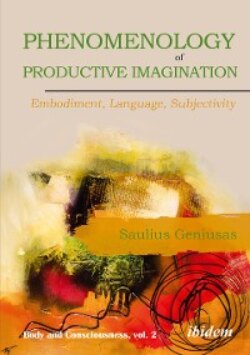Оглавление
Saulius Geniusas. Phenomenology of Productive Imagination: Embodiment, Language, Subjectivity
ACKNOWLEDGMENTS
INTRODUCTION
CHAPTER I. What is Productive Imagination? From Kant to Phenomenology. Introduction
Methodological Considerations
Kant on Productive Imagination
Productive Imagination in Post-Kantian Philosophy
Conclusion
CHAPTER II. What is Productive about Reproductive Imagination? Edmund Husserl’s Phenomenology of Phantasy and the Constitution of Cultural Worlds. Introduction
What is Reproduction and What is Reproductive Imagination?
Perception and Imagination
Memory and Phantasy
The Role of Phantasy in the Constitution of Cultural Worlds
Conclusion
CHAPTER III. Between Phenomenology, Pragmatism and Metaphysics: Max Scheler’s Concept of Productive Phantasy. Introduction
Scheler’s Critique of Pragmatism
Productive Phantasy and the Genesis of Experience
Sensation, Perception and Phantasy
The Psychic, Historical and Cultural Dimensions of Productive Phantasy
Phantasy and Desire
The Development of Productive Phantasy
The Limits of Productive Phantasy
Life, Spirit, and Productive Phantasy
Conclusion
CHAPTER IV. Between Phenomenology, Ontology and Philosophy of Culture:Productive Imagination and the Cassirer-Heidegger Disputation. Introduction
The Historical Setting
Productive Imagination and the Subjectivity of the Subject
The Copernican Turn
Terminus a Quo and Terminus ad Quem
Freedom
The Possibility of Reconciliation
Temporality
Conclusion
CHAPTER V. From Phenomenology to the Kyoto School: Miki Kiyoshi and the Logic of Imagination. Introduction
Miki as a Phenomenologist
The Standpoint of Contemplation and the Standpoint of Action
The Field of Imagination as the Field of Action
The Logic of the Imagination as the Logic of Collective Representations
The Logic of Imagination as the Logic of Symbols
The Logic of Imagination as the Logic of Forms
The Logic of Imagination as the Logic of Institutions
Conclusion
CHAPTER VI. From the Phenomenology of the Body to the Ontology of the Flesh: Maurice Merleau-Ponty and Embodied Imagination. Introduction
Merleau-Ponty’s Early Phenomenology of Imagination
Two Forms of the Imaginary in the Sorbonne Lectures (1949-1952)
Imagination and Perceptual Faith in The Lectures on Passivity (1954-1955)
Phenomenological Ontology and the Imaginary Texture of the Real in “Eye and Mind”
Conclusion
CHAPTER VII. From Phenomenology to Hermeneutics: Paul Ricœur’s Philosophy of Productive Imagination. Introduction
The Paradox of Irreality
Utopian and Constitutive Tendencies: Sartre, Castoriadis and Ricœur
The Reproductive Model of Imagination
The Productive Model of Imagination
Pre-Predicative Imagination and the Genesis of Metaphors
The Paradox of Irreality Revisited
Conclusion
CHAPTER VIII. From Jean-Paul Sartre to Paul Ricœur: Ricœur’s Lectures on Imagination Revisited. Introduction
Where is Pierre? The Paradigm of Absence and Reproductive Imagination
Ricœur as Sartre’s Follower and Adversary
At a Crossroads: Sartre and Ricœur Part Ways
Painting as a Form of Productive Imagination
Towards a Phenomenology of Productive Imagination
Conclusion
CHAPTER IX. Productive Imagination and Embodiment. Introduction
Productive Imagination and the Subjectivity of the Subject
Phenomenology of Embodied Subjectivity
Embodied Subjectivity and Imagination
Productive Imagination and Embodiment
Embodiment and Social Imaginaries
Phenomenology of Embodiment and Carnal Hermeneutics: A New Ground for the Philosophy of Imagination?
Conclusion
References
